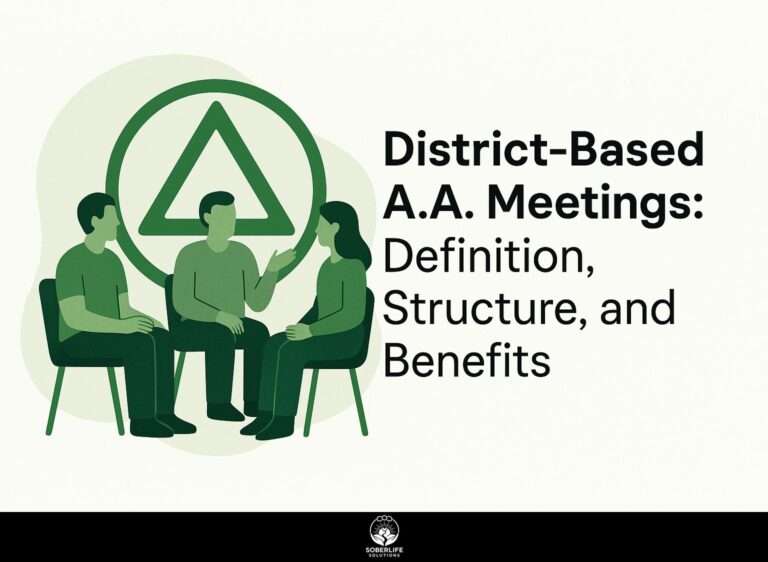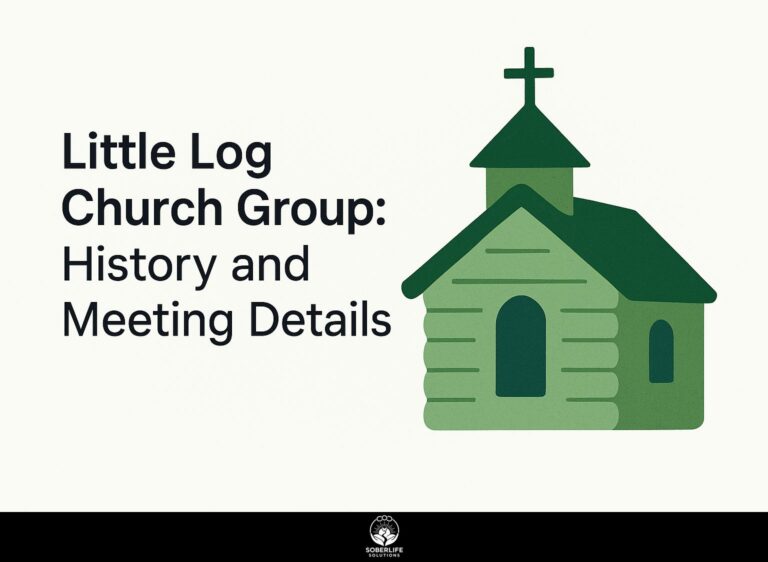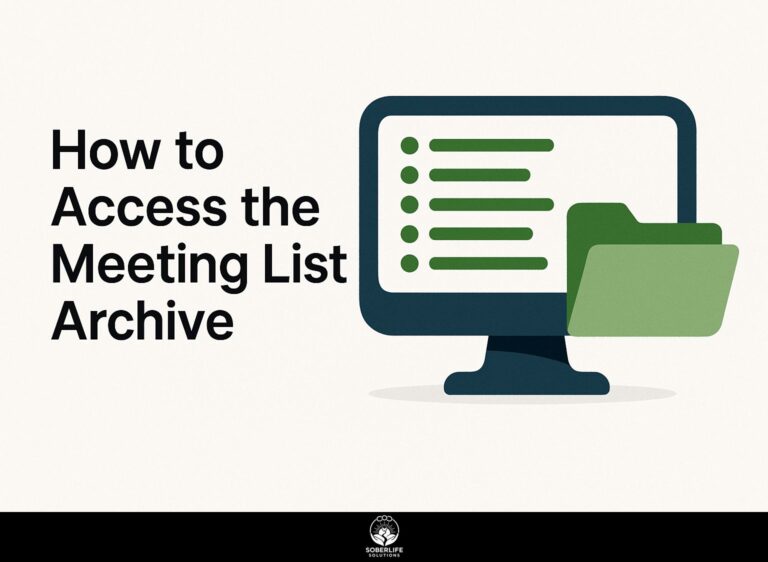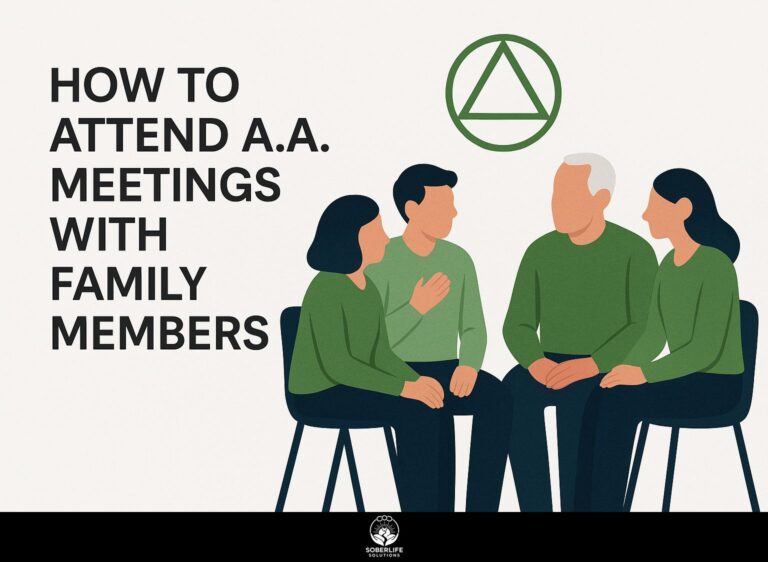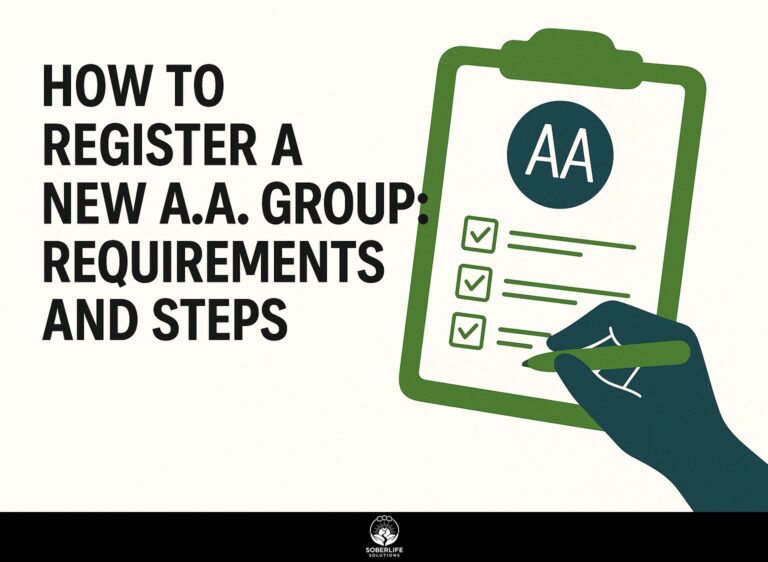A.A. Meetings: Types, Benefits, and Attendance Tips
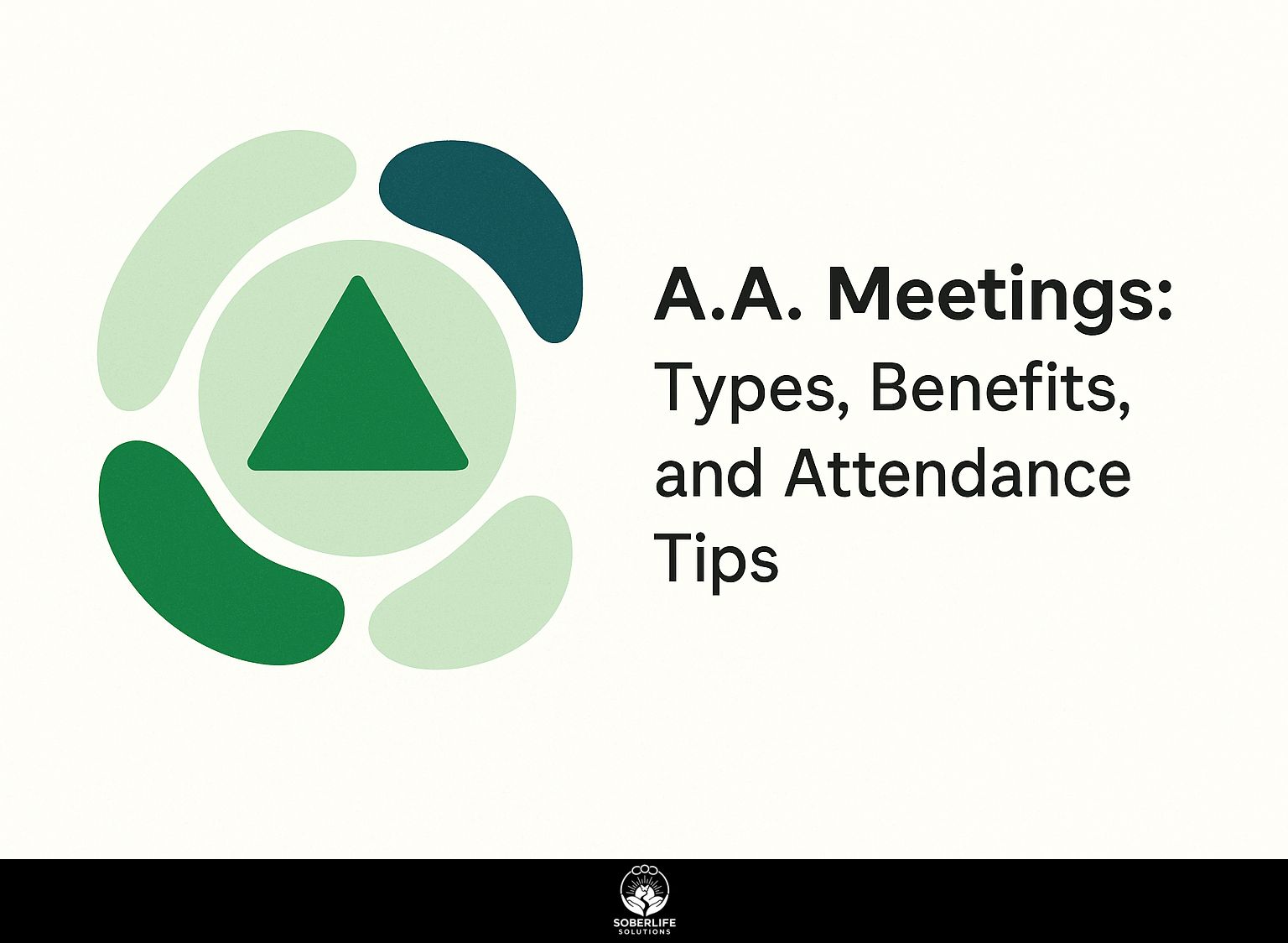
Struggling with alcohol addiction can feel isolating, but AA meetings offer a supportive path to recovery. Alcoholics Anonymous provides various types of meetings, including open meetings for anyone interested and closed meetings dedicated to individuals facing addiction. In this article, we’ll look at the advantages of joining these sessions, suggest ways to get the most out of them, and explain how they help with ongoing addiction recovery. Come and find out about the support and responsibility available through AA.
Key Takeaways:
A.A. Meetings Overview
A.A. meetings are important for helping people recover from addiction, creating a community and shared experience. For newcomers, understanding what to expect can be crucial to a successful recovery journey; our guide for new members provides insights into your first A.A. meeting experience.
Purpose of A.A. Meetings
The primary purpose of A.A. meetings is to provide a supportive environment where individuals can share experiences and learn coping strategies as part of the 12-step recovery process.
During these meetings, members share their challenges and achievements, creating an environment of mutual help and responsibility.
For example, one person might talk about how going to daily meetings changed their view, encouraging others to try the same habit. Peer-led discussions often highlight specific coping techniques, such as journaling or mindfulness exercises.
This sharing process helps create a community feeling and has been shown to improve recovery results because members feel less alone and more confident in their path to sobriety. This is supported by resources from reputable organizations like the Substance Abuse and Mental Health Services Administration, which provides a National Helpline offering support for mental health and substance issues.
Structure of Meetings
A.A. meetings typically follow a structured format that includes readings from the Big Book, sharing sessions, and opportunities for feedback.
Meetings usually begin with introductions, where members state their names and sometimes share their recovery time. This helps build a feeling of togetherness and belonging.
Following introductions, there’s a reading from the Big Book or other recovery literature, such as Alcoholics Anonymous featured on Goodreads, which sets the tone for the discussion. The sharing session allows attendees to express their thoughts or experiences, with some meetings encouraging specific topics for focus.
Meetings conclude with a closing statement or prayer, reinforcing the supportive environment and committing to continued recovery. Adjustments can be made based on the group’s needs, such as incorporating guided discussions or themed meetings to engage different members effectively.
Types of A.A. Meetings
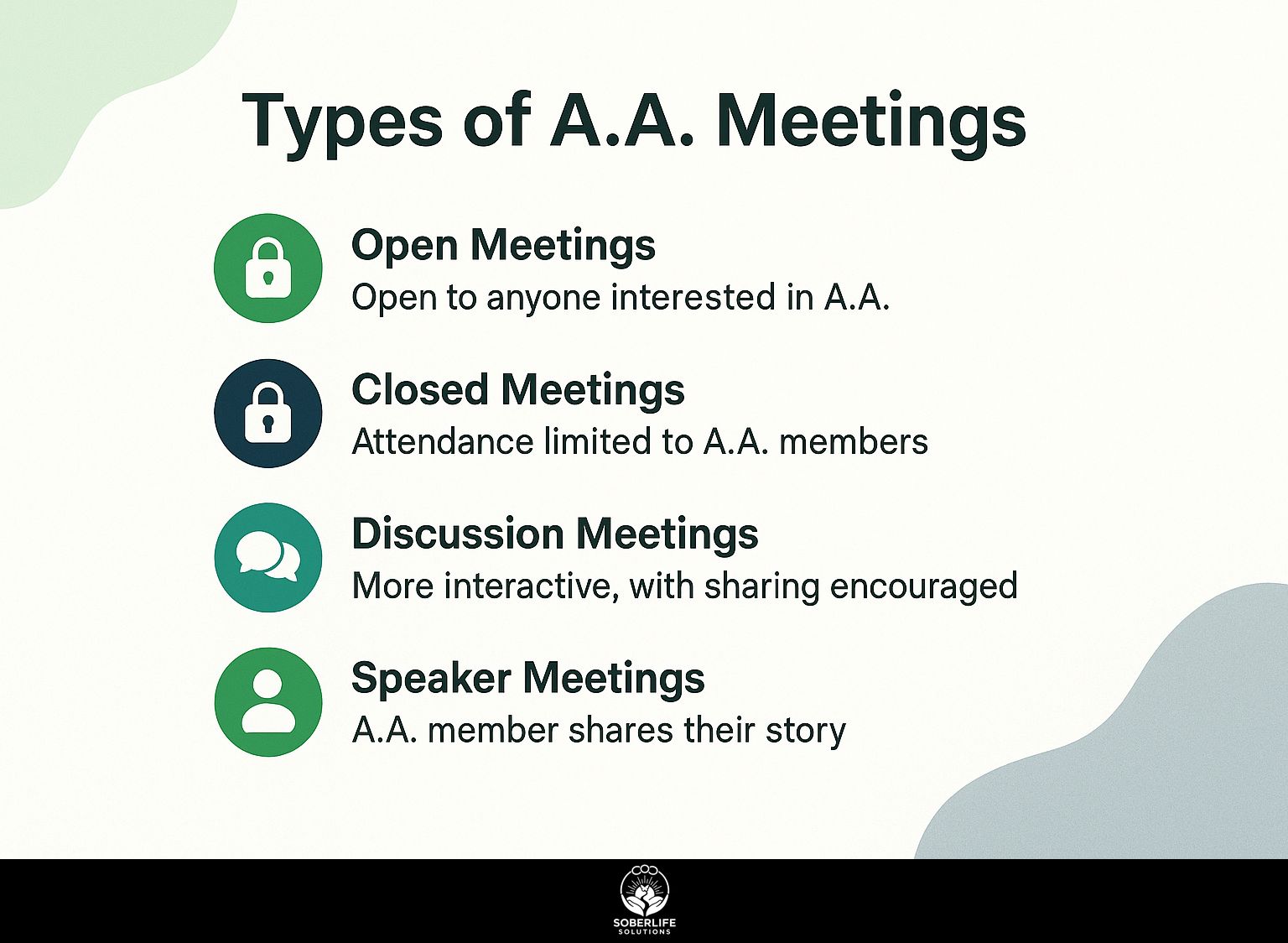
Knowing about the various A.A. meetings can improve your recovery by helping you find the right setting for your needs. If you’re interested in optimizing your meeting search, consider exploring how to use filter options to find A.A. meetings effectively.
Open Meetings
Open meetings are accessible to anyone interested in learning about A.A., providing a welcoming space for friends and family to support members.
These meetings are important for clarifying the recovery process and promoting conversation.
To locate local open meetings, check the A.A. website or use smartphone apps that display nearby events by location and time. These meetings encourage community support and often have speakers who tell their personal stories, helping new people connect and participate.
Going to meetings often helps build relationships that go beyond the gatherings, strengthening a helpful community for the participants and their allies.
Closed Meetings
Closed meetings are exclusively for individuals who identify as having an alcohol use disorder, ensuring a safe and confidential atmosphere for sharing experiences.
These meetings encourage openness and honesty, letting people talk about their difficulties and achievements without worrying about being judged.
For instance, a closed meeting focused on relapse prevention might include guided discussions on personal triggers, coping strategies, and sharing of relatable experiences.
Using tools like guided questions or themed discussions can help more people join in and share their thoughts.
Accountability partnerships formed during these meetings can encourage ongoing support and personal growth, strengthening the overall recovery process.
Discussion Meetings
Discussion meetings emphasize open sharing, allowing attendees to engage in dialogue about their experiences and challenges in recovery.
To effectively contribute, participants can prepare by reflecting on their own experiences related to the meeting’s theme.
Paying attention when others speak creates a helpful atmosphere, and saying “I understand” or asking detailed questions makes the talk more meaningful.
To help everyone feel like they are being listened to, look them in the eye, nod to indicate you understand, and wait until they are done talking before you reply.
Setting simple rules, such as time limits for speaking, helps keep the conversation respectful and on track, creating a positive peer support environment.
Speaker Meetings
Speaker meetings involve individuals sharing their personal recovery stories, providing help and empathy to those listening.
Typically, each speaker shares their story for 10-15 minutes, highlighting personal challenges and breakthroughs. This is followed by a discussion period, lasting about 20 minutes, where attendees can ask questions or share their experiences.
Hearing different points of view can be very helpful; for example, one person might talk about ways to manage anxiety, while another shares tips on repairing relationships. This exchange builds a feeling of community and awareness, supporting the idea that recovery is a personal experience shared by many.
Benefits of Attending A.A. Meetings
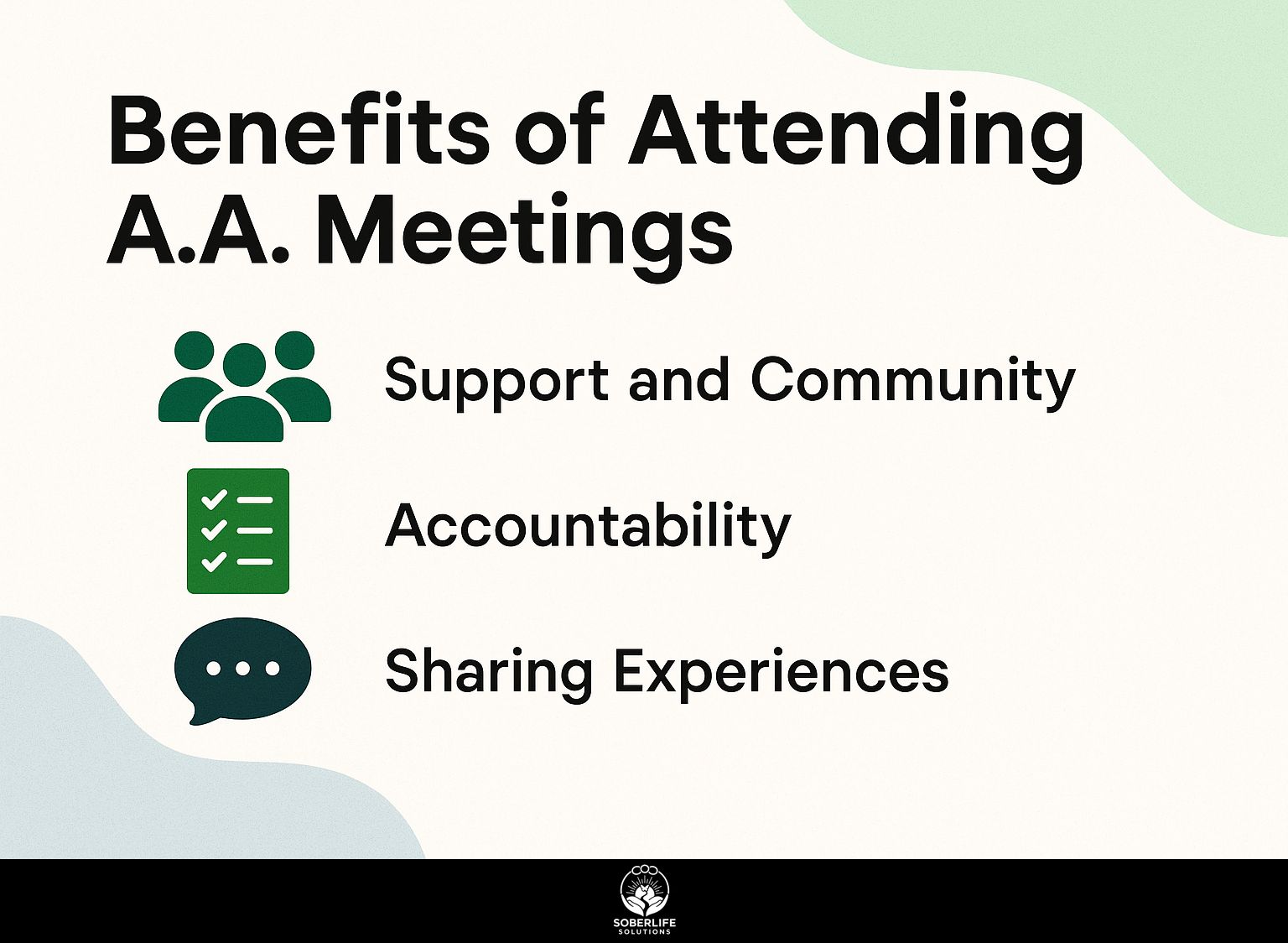
Going to A.A. meetings provides many benefits, like better support networks, staying responsible for staying sober, and the opportunity to talk about experiences with others. The diversity in A.A. meeting formats, including open and closed meetings, further enhances these experiences by catering to different needs and preferences.
Support and Community
The feeling of belonging in A.A. meetings helps people build strong bonds, offering needed emotional support for recovery.
Studies show that participants who actively engage in community support networks report a 50% higher success rate in maintaining sobriety. This support manifests through shared experiences, accountability partnerships, and group discussions, helping members build trust and resilience.
Regular meetings create a safe space where individuals can express vulnerabilities and share coping strategies. Having friends in the group can help you stick to sobriety, offering the support needed to handle challenges.
Many members find that forming these relationships is as important as the program itself, reinforcing their path to recovery (as highlighted by research from Penn State University).
Accountability
Regularly attending A.A. meetings helps people stay responsible and encourages them to stick with their recovery.
Using some strategies can improve this accountability more. Encourage members to share specific recovery goals during meetings, creating a collective commitment. For example, a person might plan to attend three meetings each week or choose to drink alcohol only at specific events.
Forming accountability partnerships can be beneficial; pair individuals who check in with each other daily or weekly to discuss progress. Apps like ‘Sober Time’ help track progress and share updates, creating community support and encouragement.
Sharing Experiences
Sharing personal stories in A.A. meetings helps individuals reflect on their own lives and learn important lessons from others.
This sharing builds friendships and creates a place where people can help one another.
For instance, a member who overcame a major hurdle may inspire others facing similar challenges. Listening closely allows participants to feel heard. Paying attention to the speaker without cutting them off can greatly improve comprehension.
Creating a welcoming environment allows people to share openly, resulting in meaningful experiences, such as a moving story that resonates with many attendees. Using these methods helps turn personal challenges into shared healing moments.
Tips for Attending A.A. Meetings
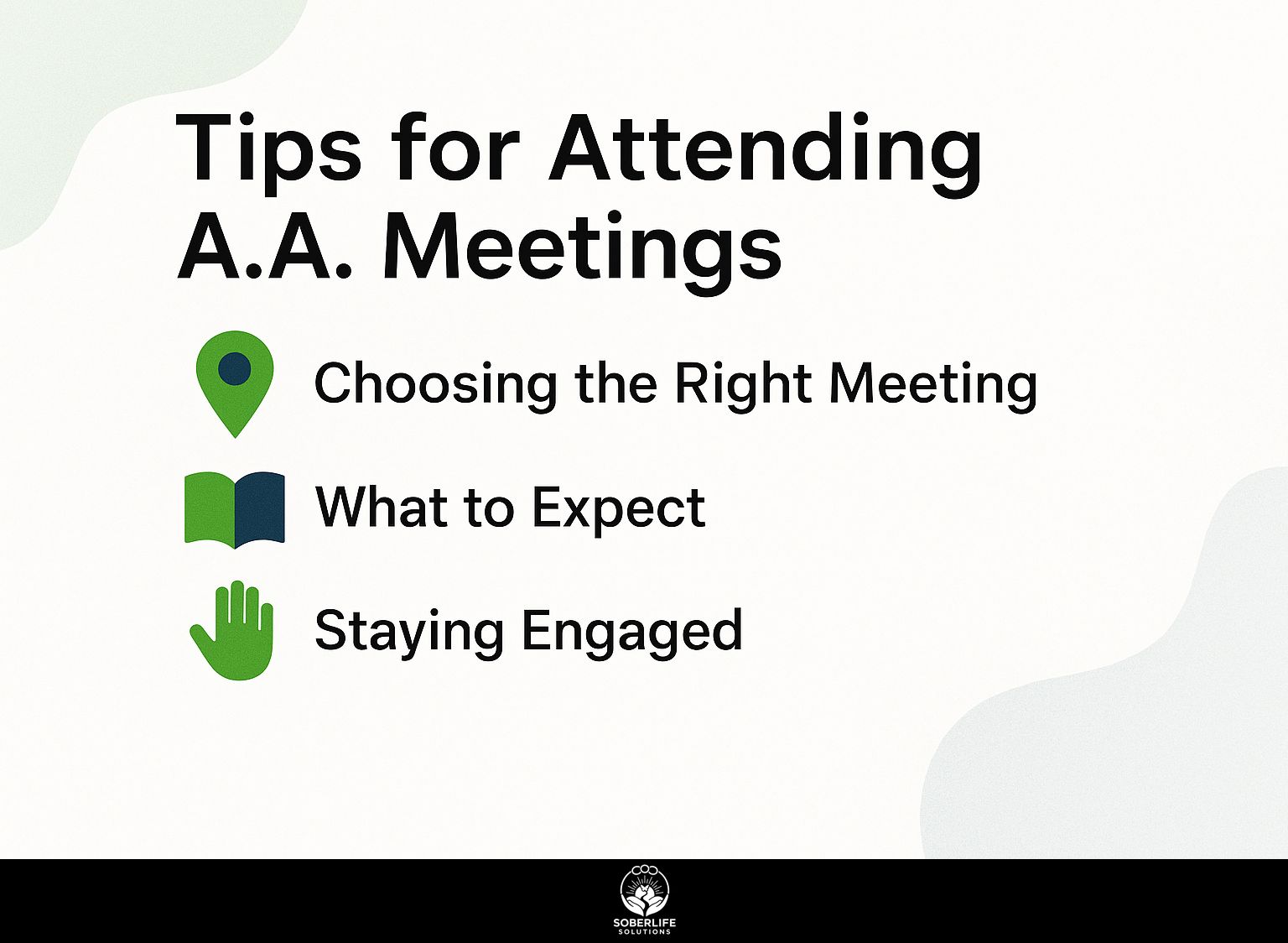
Starting out at A.A. meetings can be confusing for new attendees; these tips will help you feel ready and involved from the start. To enhance your experience, you might find it helpful to stay connected with A.A. meetings while traveling through various methods. Learn more about staying connected here.
Choosing the Right Meeting
Choosing the right A.A. meeting is important for feeling comfortable and building relationships, especially for newcomers looking for groups that match their age or background.
To locate the best meetings for you, use the A.A. website’s ‘Find a Meeting’ tool, which lets you search by where and what kind of meeting it is.
Check local directories such as AA Meeting Finder or local community resources.
Think about the type of meeting-open, closed, or focused on a specific topic-and make sure it fits what you need.
For instance, if you’re in recovery from alcohol abuse as a woman, look for women-only meetings. Being part of a group with shared interests helps you feel connected and supported.
What to Expect
New attendees can anticipate a welcoming environment in A.A. meetings, where the focus is on sharing and support without judgment or pressure.
During your first meeting, you’ll likely experience a warm introduction, which often includes a brief personal story from the leader or a volunteer.
It’s normal for each person to say their first name, but you don’t have to say anything more if you don’t want to.
You might also encounter common practices such as passing around literature about A.A.’s principles and resources.
Remember, the atmosphere is designed to be non-threatening; if you feel nervous, simply listen and observe before joining in. People are here to support one another as they progress.
Staying Engaged
Joining A.A. meetings helps with recovery and strengthens connections with other members.
To stay involved during meetings, try asking questions that lead to more conversation, like ‘What difficulties have you faced this week?’ or ‘How did you handle a craving recently?’ Sharing your own experiences, even short stories, helps build relationships and can motivate others.
Utilizing tools like a notebook to jot down thoughts or trigger memories can be helpful. Try to attend regularly, as this helps form connections and shows your dedication to recovery, benefiting you and others.
Frequently Asked Questions
What are A.A. meetings and what types are available?
A.A. meetings, or Alcoholics Anonymous meetings, are support group sessions for individuals struggling with alcohol addiction. There are two primary types of A.A. meetings: open meetings, which allow non-members to attend and observe, and closed meetings, which are only open to members.
What are the benefits of attending A.A. meetings?
A.A. meetings provide a supportive and non-judgmental environment for individuals to share their experiences and struggles with alcohol addiction. Attending A.A. meetings can also provide a sense of community, accountability, and motivation for maintaining sobriety.
How often should I attend A.A. meetings?
The frequency of attending A.A. meetings may vary for each individual, but it is generally recommended to attend at least one meeting per week. People who are newly sober might find it helpful to go to meetings more often to keep working toward their sobriety goals.
What can I expect at an A.A. meeting?
At an A.A. meeting, you can expect to hear personal stories and experiences from other members, as well as participate in discussions and group activities related to addiction recovery. A.A. meetings also often include readings from A.A. literature and opportunities for peer support and guidance.
What are some tips for attending A.A. meetings?
Here are some suggestions for attending A.A. meetings: get there early, respect everyone’s privacy and anonymity, join in the discussions, and be willing to hear various points of view. It is also important to adhere to the principles of A.A. meetings, including honesty, respect, and non-judgment.
Can I attend A.A. meetings even if I am not ready to stop drinking?
Yes, you can attend A.A. meetings even if you are not yet ready to stop drinking. A.A. meetings are open to anyone who wants to learn about alcohol addiction and how to recover. You can find support and guidance to help you stay sober. However, you should follow the rules and guidelines of A.A. meetings, such as staying sober while attending.

